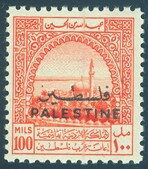Stamp: Akko Sight- overprinted (Palestine, Jordanian Occupation 1948)
Akko Sight- overprinted (Palestine, Jordanian Occupation 1948)
01 October (Palestine, Jordanian Occupation ) within release Akko Sight- overprinted goes into circulation Stamp Akko Sight- overprinted face value 100 Palestine mil
| Stamp Akko Sight- overprinted in catalogues | |
|---|---|
| Michel: | Mi: JO-PS Z9 |
| Stamp Number: | Sn: JO NRA9 |
| Stanley Gibbons: | Sg: JO PT43 |
Stamp is square format.
Also in the issue Akko Sight- overprinted:
- Stamp - Akko Sight- overprinted face value 100;
- Stamp - Akko Sight- overprinted face value 200;
- Stamp - Akko Sight- overprinted face value 500;
- Stamp - Akko Sight- overprinted face value 1;
Stamp Akko Sight- overprinted it reflects the thematic directions:
A building or edifice is a structure with a roof and walls standing more or less permanently in one place, such as a house or factory. Buildings come in a variety of sizes, shapes and functions, and have been adapted throughout history for a wide number of factors, from building materials available, to weather conditions, to land prices, ground conditions, specific uses and aesthetic reasons. Buildings serve several needs of society – primarily as shelter from weather, security, living space, privacy, to store belongings, and to comfortably live and work. A building as a shelter represents a physical division of the human habitat (a place of comfort and safety) and the outside (a place that at times may be harsh and harmful).
Mosquitoes, the Culicidae, are a family of small flies consisting of 3,600 species. The word mosquito (formed by mosca and diminutive -ito) is Spanish and Portuguese for little fly. Mosquitoes have a slender segmented body, one pair of wings, three pairs of long hair-like legs, and specialized, highly elongated, piercing-sucking mouthparts. All mosquitoes drink nectar from flowers; females of some species have in addition adapted to drink blood. The group diversified during the Cretaceous period. Evolutionary biologists view mosquitoes as micropredators, small animals that parasitise larger ones by drinking their blood without immediately killing them. Medical parasitologists view mosquitoes instead as vectors of disease, carrying protozoan parasites or bacterial or viral pathogens from one host to another.


